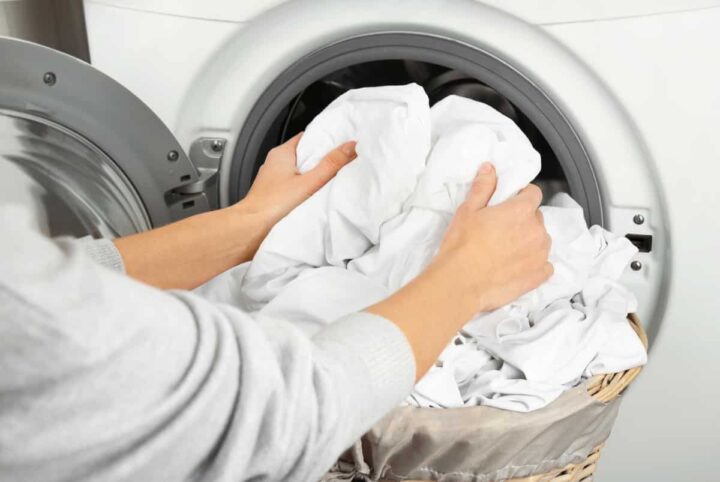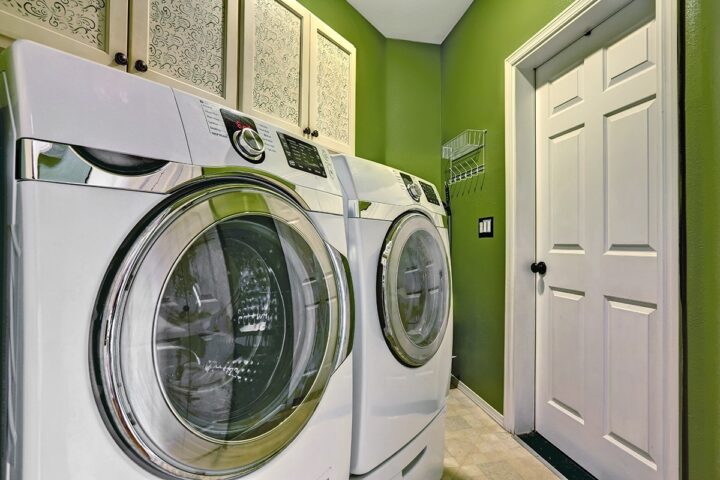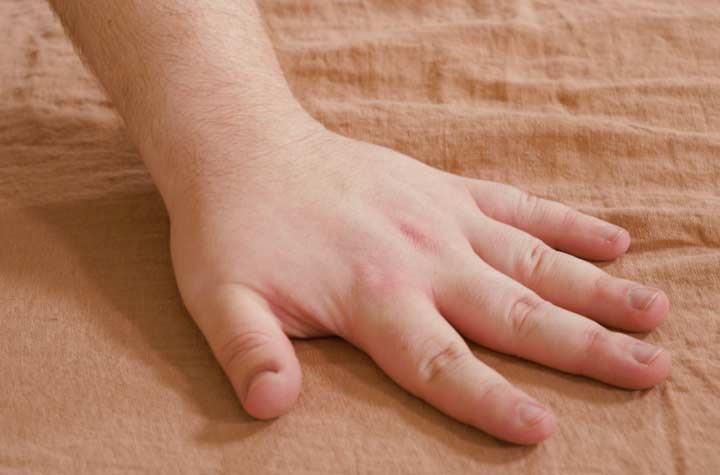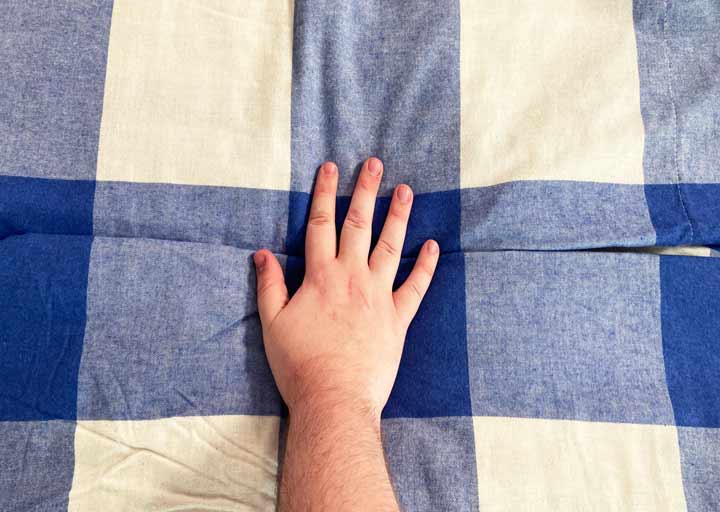Whether you prefer crisp, soft, light, or moisture-wicking sheets, there’s something so nice about crawling into a bed with freshly laundered sheets after a long day. You may assume that fabric softener will keep your sheets smelling fresh and feeling soft, but that is by no means a steadfast rule. So — can you use fabric softener on sheets? Let’s find out!
What Does Fabric Softener Do?
Fabric softeners can enhance a fabric’s fluffiness, softness, and scent while controlling for electric static and pilling. They are made from a chemical formula that includes lubricants and humectants, which leave an electrically charged coating on a fabric’s surface, resulting in less friction between fibers. This formula helps keep the material fluffy, soft, pill-free, and fresh.

The downside of using fabric softeners is that these chemicals affect the fabric’s moisture wicking ability, absorbency, and flammability (not to mention the negative impact of some chemicals on our environment).
Fabric Softener vs Dryer Sheets
Liquid fabric softeners, introduced in the US in the 1950s, are added to the washing machine during the rinse cycle. In contrast, dryer sheets, introduced in the 1970s, are non-woven fabric sheets or pieces of polyurethane foam that have been treated with liquid fabric softener for use in machine dryers.
Both types of softeners utilize the same coating technique. However, dryer sheets may do a little better in increasing the breathability and absorbency retention of fabrics, while liquid softeners have a tendency to soften fabrics better.
Types of Fabric Softener
Fabric softeners come in different forms, such as liquid, powder, and pod. Each type has a distinct attribute and needs to be used slightly differently.
Liquid Fabric Softener
Fabric softener liquids, powders, and pods go into the washing machine dispenser so they can be released during the rinse cycle. Beads typically go directly into the machine’s drum, but they’re often used more for fragrance rather than softening. You may also find some detergents that have “a touch of” a fabric softener added to them.
Softener Sheets
Softener sheets are put directly into machine dryers. Many people feel these are less effective in softening clothes but work great for reducing static cling.
Dryer balls
Dryer balls are eco-friendly alternatives. Because they’re often made of compressed wool, rubber, and plastic, they are also great for folks who suffer from allergies. Simply put them in the dryer to help soften the fabric and keep wrinkles away.
Can You Use Fabric Softener on Sheets?
Using fabric softeners each time you wash your sheets is a no-no. Fabric softeners coat a fabric’s fibers and reduce the fabric’s air permeability, leaving behind a film that can start to feel heavy and slimy. Softeners can also affect the efficiency of your machine by leaving behind a build-up of this coating. There are many great softening alternatives when washing your sheets, such as dryer balls, vinegar, and baking soda.

If you decide to use fabric softener on your sheets, try to use it only every third time so that there is less opportunity for the softener’s coating to clog the sheets’ “pores.” It’s essential to use fabric softeners as intended and follow the directions outlined by the manufacturer.
Cotton Sheets
Percale is a style of woven cotton sheet known for its uncanny ability to get softer over time, so adding fabric softener is not needed.
Egyptian Cotton Sheets
Using harsh softeners on Egyptian cotton sheets can damage their sumptuous quality and breathability. Instead, tumble dry the sheets with a wool dryer ball. This can help keep the sheets in good condition and prevent wrinkles.
Linen Sheets
Linen sheets also become softer each time they are washed, so there is no need to add fabric softeners. Instead, mix ½ cup of baking soda with laundry detergent to soften your luxurious linen sheets.

Bamboo Sheets
Fabric softeners can stain and damage bamboo sheets. To keep them in top shape, wash in cold water with mild detergent and line dry.
Silk and Satin Sheets
Both silk and satin sheets need to be handled with TLC. Harsh fabric softeners will damage the fibers and possibly stain the fabric. In addition, silk and satin should stay away from hot water, a hot dryer, or even the hot sun.
Flannel Sheets
The conundrum with flannel sheets is that using fabric softeners to prevent pilling will backfire and leave you with more pills and stiffer sheets over time. Instead, wash them with mild detergent in warm water on the gentle cycle. You can also use a small amount of vinegar the first time you wash them.

Microfiber Sheets
Never use fabric softeners or heat on microfibers; this will ruin the fabric by melting or breaking the fine woven fibers. Instead, use a dryer ball on a low heat or a no-heat dry cycle, and make your bed immediately when they are finished drying to avoid wrinkles.
Fabric Softener Alternatives
If you are confused about washing your bedding, take a look at these fabric softener alternatives.
Baking Soda
Baking soda is a tried-and-true option that works particularly well on linen sheets. Use ½ cup mixed with laundry detergent and wash normally.
Vinegar
Vinegar can be mixed with baking soda to soften sheets and help rid them (and your washing machine) of the slick build-up that fabric softener often leaves behind.
Bamboo or Wool Dryer Balls
Bamboo and wool dryer balls help reduce wrinkles by separating the clothing as it dries. For a pleasing scent, you can add a few drops of your favorite essential oil onto a wool or bamboo dryer ball and toss that in with your sheets.
Tennis Balls
A clean tennis ball can be added to the dryer to help reduce static and wrinkles. This will also speed up drying time.
Soap Nuts
Soap nuts, or the dried shells of soapberry nuts, are sustainable alternatives to fabric softener. Simply add five soap nuts to a cotton bag and toss it in the drum of your washing machine. Your sheets will come out soft and clean, and it’s friendlier to the environment.
FAQs
Have more questions? Read on!
Is fabric softener bad?
Chemical fabric softeners are hard on the environment, your skin, and fabrics.
Is fabric conditioner the same as fabric softener?
Yes. People in the UK often refer to it as a conditioner, while in America, we tend to use the term softener.
Is fabric softener necessary?
No, if you are looking for soft sheets, many alternatives work well or even better than traditional fabric softeners.
Are dryer sheets fabric softener?
Yes, they are a type of fabric softener that is only used in a dryer.
Are fabric softener sheets toxic?
Some scented dryer sheets contain chemicals that can damage human and environmental health. There are dryer sheets available that do not contain these chemicals and are easier on the environment and individuals’ health.